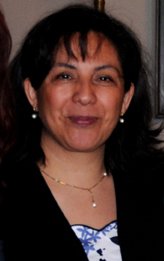|

Mariela Griffor is an editor, translator, and poet. She was
born in the city of Concepción in southern Chile. She is the author of Exiliana
(Luna Publications, 2007) and House (Mayapple Press, 2007) and founder
of Marick Press. Mariela holds an MFA in
Creative Writing from New England College. Her forthcoming publications include
the translations Canto General by Pablo
Neruda (Tupelo Press) from Spanish and Bye,
have a good time! by Kristina Lugn from Swedish. Here, we are also talking
to Mariela about her new poetry collection, The
Psychiatrist (Eyewear Publishing, London UK), published in October 2013.
Zinta for The Smoking Poet: Welcome to our pages, Mariela. We
have been fans at TSP for a long time of your poetry, so it’s a thrill to talk to you about your new poetry collection,
The Psychiatrist. That’s an unusual title for a poetry collection. Can you
tell us more about it? Mariela Griffor: The title of the book carries the title of one of the poems of the collection. This book is
a New & Selected, thirteen poems from my first book, Exiliana, two poems from
the second one House and twenty one new poems published individually in literary
journals and magazines. TSP: Can you tell us also about your previous two collections,
Exiliana (our earlier review of that collection is reprinted on our Zinta Reviews page in this issue) and House? Is The
Psychiatrist something of a continuation of your poetic journey or more of, well, lying down on the therapy couch and
going deeper? And we writers all know that writing is therapy … Mariela: I understand. Poetry is not therapy for me but I do understand
that it can work that way for many people which is perfectly fine. For me it is something deeper, more like part of my daily
life. I can see the poems everywhere – like alternative ways of experiencing that daily life – I would say it
is more similar to a way of seeing the world than anything else. When I was younger my world experience was completely determined by politics, my country was a polarized, and
my family was divided because of politics, my teachers were people who were pro or in opposition to the government. I wrote
very few poems then and got one or two published by my university poetry cIub. I would say that at that time I was a political
poet or starting to be. I think poetry slowly
took over the space that politics had in my life before, and poetry slowly became a bigger deal, like wanting to be a public
voice more than a political voice. In that transformation I visited hell a couple of times like losing very close friends
under the Pinochet regime. I was forced into exile, I didn’t speak with my father—more like he didn’t speak
to me — for eleven years, my mother refused to visit me in Sweden or in the States so I needed to cut ties I was not
ready to cut at all. I needed to learn to speak English fluently which I knew from high school but it was bad, rusty and inefficient.
I started to lose more friends who continued the fight against the military in Chile, and I lost my grandparents who were
my source of unconditional love in Chile. I never was able to attend the funerals of any of them. I wrote poems but I also wrote longer drafts of other writings. I was obsessed with learning
English, and that became easier with time. Finally I got hooked on the taste for words, similar to the passion I have for
them in Spanish. There were more and more exciting and provocative things I could say better in English than in Spanish and,
when I discovered that fact, I fell in love with the language - it was a very exciting time for me. I finished Exiliana, and I went out to seek
a publisher, believing it would be easier than to publish a novel since I had already gotten some interest for my novel in
2005, but it never passed the editorial board of Penguin at that time. The acquisitions editor got my novel and wanted to
buy it but it didn’t get past the board; so I tried to write poetry which I thought would be easier to publish. I was
so wrong in that, too, because when the publisher got one of my first manuscripts they didn’t like my love poems so
I needed to cut them from the book. It was in that way that my second book was born; otherwise there would only be one! In the last few years
I’ve written new poems and they are included in this new and selected. It is very much a continuation of the same kind
of themes, but I’m pretty sure it is the last book of this series or of this kind of writing. I don’t know exactly
what I’m going to write next, but I do feel this book is a pretty much the last one of this kind.

TSP: This
collection brings together new poems with poems selected from the past,
spanning 1986 to 2011. Talk to us about the choices you had to make to create
this collection.
Mariela: The
poems I chose for this last book are ones where I’m witnessing the events of
the world. I had been using a big “I” in the creation of these poems. I had
been in the middle of the political storm with my emotions, shouting, I wanted
to make public this incredible, repugnant disgust for military forces
controlling the lives of citizens everywhere. This political machinery that
never ends. I found that poetry was a way for me to keep centered without
losing focus. This book is moving across the shifting social grounds we are
experiencing right now: dislocation, refugees lives, political idealism,
motherhood, affiliation and hope despite all the plagues that inundate us. Those
are the kind of themes in many of these poems.
TSP: You are not
only a poet. You are also an editor, a translator, founder and publisher of
Marick Press. That surely means you bring a unique perspective to your work,
seeing it from different angles. Does that make it easier or harder? When you
are putting together your collection, do you look at it also with your
publisher’s eye for potential, for instance? Does the inner editor get in the
way?
Mariela: No, not
at all. The publisher of this book is unique, very different from other
publishers I know. They are very solid and they know what they want and they
have a marketing team that welcomes all your ideas but does all the marketing
and publicity work for you. It is very exciting, it is a different experience;
they are located in England. They are professional in all senses. I don’t have
to worry about how to market the book because they already had a plan from the
beginning. The editor was a blessing, all the suggestions were well received
and unlike other occasions I didn’t feel like I was overwhelmed with the
interaction with the editor or the changes or the demands.
TSP: Do you
translate your own work or just that of others?
Mariela: Although
I am multilingual, I’ve found that translating my own work from one language to
another is very nearly impossible. Each language contains its own layers of
meaning, subtle cultural nuances that simply can’t be accurately — but only
approximately — translated. Not to mention the different rhythms and the sheer
musicality in different languages that is so very much a part of poetry.
TSP: Do you write
in the same style in different languages—or do you find something different
depending on what language you are writing in?
Mariela: No, not
anymore. I did in the beginning when I had just arrived in Michigan, I was
writing more in Spanish at that time and nobody wanted to publish anything in
Spanish, at least not in my circles in Detroit so I needed to translate my own
poems. Then I started writing directly in English to save myself some time but
once in a while poems still come to me in Spanish. Suddenly other people were
interested in my English and my Spanish poems as well. All the languages I
speak and write are different from each other.
TSP: You’ve said
that your new collection is about “the shifting ground of modern society across
cultures and nations.” Explain that.
Mariela: We all
know that there are forces that are fighting each other, I’m not talking about
metaphysical forces but economic forces that cross cultures and nations. They
are shifting and changing. People are not willing to tolerate repression,
hunger, exploitation in the same way as decades ago. The financially dominant
class is shifting into an undefined new class coming from those who have acquired
education in different countries. In between these pockets of dominance there
are small spaces or instances of political vacuum where subversion occurs and I
try to explain the origin of that. My poem “Thanks for Your Call” is about
that.
TSP: And
political idealism … that’s something that has entered into your life and sent
you sometimes spinning out into the world on entirely new and unexpected paths.
Your fiancé was a political activist in Chile, assassinated by Augusto
Pinochet’s secret police in 1985. You were forced to flee your homeland. Please
share with us, if you would, something of your life story, as it surely has
infused your writing, too.
Mariela: Politics
is something that needs to be handled with gloves. If you are going into it you
should be prepared to go all the way. I don’t recommend being political if you
are not willing to be informed and seek correct information, if you want to
live a life without worries and any kind of sincere attachment do not go into
politics as a career; I mean to say that politics becomes a force in the life
of an individual who get involved. I don’t go deep into politics without being
very well informed. I don’t think I will ever again join a political party or
any political organization. I already paid a price and it was too high, almost
unbearable to me but I do study politics from another point of view, a more
philosophical point of view trying to find the truth of it, not as an idealist
like when I was younger. I like being part of organization that is dedicated to
the improvement of society but one that is inclusive of different political
views. If I ever have to enlist myself
in a political alliance I am quite sure it would never be on the conservative
side.
TSP: You are also
a Consul of Chile …
Mariela: That’s
true and an interesting thing I haven’t had the opportunity to explain before.
I was giving a talk at Wayne State University about how to manage one’s time
between being a writer and a publisher. The telephone rang and it was the
Chilean ambassador who called me to ask me if I was interested in the position.
I asked him what that would require of me and he told me briefly the demands of
the job and also told me that I would need to go to Chile to get accreditation
from the President. I told him that, in that case, I didn’t think it would work
out because I didn’t have plans to return to my country, after having left it
for a second time in 1998. I hadn’t been back and I didn’t have plans to do so.
But I added that one never knows.
They called
me anyway after a couple of months, and they
decided to make me Consul here in Michigan. I was delighted. He said they
wanted this to be the beginning of a new relationship with my own country. I
took that as a huge compliment, and I decided that I could do a lot of good for
Chileans outside of Chile and also to myself. It is very hard sometimes,
because what happened many years ago is still very painful. But I don’t dwell
on the past without trying to find a path into the future, and I truly believe
we Chileans will be able to heal and advance together when those responsible
for crimes and torture are made accountable. I don’t believe that people are
willing to simply forget those who killed and tortured indiscriminately without
punishment.
TSP: You’ve said
before that you didn’t plan on becoming a writer and poet. And yet, so fully,
you are! Not only a writer yourself, but a passionate supporter of the arts.
What changed along your journey to make you into a writer and supporter of
writers? And, you are also co-founder of the Detroit Institute for Creative
Writers. Tell us about that.
Mariela: I was
alone in a refugee camp, without any communication with my family for days, no
friends, almost no clothing because I left my country so abruptly, in fragile
health because I was two months pregnant. I didn’t come up with anything better
to do than to write letters to my family. I knew someday the letters would be
sent to them. In a refugee camp you don’t just drive off in the middle of the
day to the post office! I’ve written every day since then.
I was a
Spanish literature major and then a journalism major
at university and writing was part of my life but it was different, it was very
brainy, very detached. In the refugee camp something happened and I don’t know
exactly what but writing became compulsive; it became a daily habit. I didn’t
plan to be a writer or a poet.
I still
am not planning my career; as you know I do many
other things, and I work in different areas and I also publish other writers’
work. It is clear that if I had the possibility and could arrange things in a
different way, I would think about writing every day because it is truly one of
the things that brings me more joy. But we all have bills to pay and multiple
obligations. The Detroit Institute was a wonderful initiative but it was short,
just a couple of years because Wayne State closed the college CULMA that housed
the Institute.
TSP: People tend
to think of Detroit, Michigan, as a place of industry, of automobiles. You’ve
argued otherwise …
Mariela: This
city will be one of the more important cities in the Midwest again. It has all
the ingredients. It has tensions wherever you look, political tension, economic,
racial, you name it; but immigrants are still pouring into Detroit.
Every Michigan
governor, over the years, has made a point of
visiting multiple countries in order to bring people and business to Detroit.
Governor Granholm and Governor Schneider have both been multiple times in China
and other countries to encourage talent and entrepreneurs to relocate here. We
are some 62 different countries represented in the Detroit area and we bring
millions in investment into the area every year. 500,000 Arab Americans, 80,
000 Asians, almost 200,000 Mexicans, etc., etc.
Together
with the people that were born in the state we are
making this area into a new vibrant community. Manufacturing is increasing and,
yes, it is moving into other parts of the country. But the car companies are
outsourcing still today. Detroit is counted among the cities of emergent, new
patterns of international trade. The importance of trade will drive the
development of a new emerging market…
TSP: Another
theme in your poetry is motherhood. What does being a parent mean to you and
how has it changed your poetry over the years?
Mariela: Being a
parent means everything to me! I wanted to be a good mother before anything
else.
TSP: You have a
reading coming up in Kalamazoo, Michigan, on January 18, 2014, at Kazoo Books that will include a group of
established and aspiring poets as well as a holiday book signing there on
December 14. It’s hard work, selling poetry books! What is your advice to
aspiring poets?
Mariela: Just
write, independent of where you are, publish when you can and organize your
time taking turns between your writing and publishing periods.
TSP: Thank you
for sharing your thoughts and poetry with us, Mariela! We will include a
poem here from The Psychiatrist to
whet the appetites of our readers.
Poem without a
number: house
In this
house,
covered
to
the ceiling with my insomnia,
spilling
the
evil
of a complex
journey,
I remember:
a barricade.
A homemade bomb
made by
my
hands,
the image
of
my lover and
in my head
a
semi-automatic
as redemption.
I beg
forgiveness of all of you.
The rain
is
too thin to stop the fire.
My legs
and
arms are heavy.
Behind
me,
Santiago blazes
and bullets
whiz at the sight of who we were,
ancestral
pain
I cannot shake off.
His body
disappears from the earth into the air.
A heart
spattered in the streets follows me in my defeat.
I think
about you and
my house
on
fire,
the vision
of my father fallen to his knees,
praying
for
a miracle while
the rain
disappears
in front
of
me.
en la Isla Quiriquina
el sumbido de las caracolas
anterior a llegada de los soldados
|

